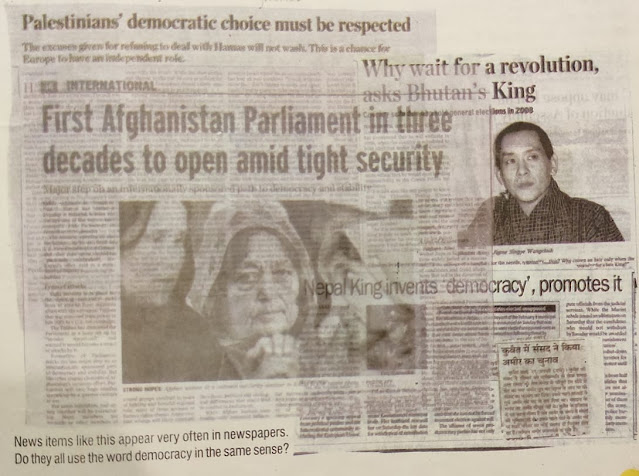8 Class.Civics.CW/HW.Chapter20.The Union Government : The Judiciary.
Chapter 20.8 Class. Civics.
CW/HW.
The Union Government : The Judiciary.
Keywords
appellate : dealing with appeals for decisions to be reversed given by a lower court.
hierarchy : a system in which members of an organization or society are ranked according to their status or authority
litigation : a legal process of resolving a dispute through a court precedent : an earlier event or action that is regarded as an example or a guide to be considered similar circumstances. witness : a person who has personally seen an event a crime, an accident, etc.
appellate : dealing with appeals for decisions to be reversed given by a lower court.
hierarchy : a system in which members of an organization or society are ranked according to their status or authority
litigation : a legal process of resolving a dispute through a court precedent : an earlier event or action that is regarded as an example or a guide to be considered similar circumstances. witness : a person who has personally seen an event a crime, an accident, etc.
Something to know
A. Tick in the correct option,
1 The Lok Adalat in generally presided over by
(a) a sitting judge
(b) retired judge
(c) District Collector
(d) judge of the district court
A. Tick in the correct option,
1 The Lok Adalat in generally presided over by
(a) a sitting judge
(b) retired judge
(c) District Collector
(d) judge of the district court
2. Who among the following does not work under the Board of Revenue?
(a) Collector
(b) Tehsildar
(c) Metropolitan Magistrate
(d) Commissioner
3. A judge of the Supreme Court may continue to remain in office till the attainment of
(a) 62 years
(b) 63 years.
(c) 64 years
(d) 8 years
4. Which one of the following statements about public interest Litigation is false?
(a) It was devised by the Supreme Court of India,
(b) It has proved to be a boon for the upper middle class people of India,
(c) It has brought legal aid to many poor, illiterate and ignorant Indians
(d) PIL is related to matters of urgent public importance.
5. Which case related to the following subjects is a civil.case?
(a) marriage
(b) robbery
(c) murder
(d) cheating
B. Fill in the blanks,
1. The highest revenue court in the district is --- which deals with the cases of land revenue Revenue.
2. Any law declared ---- immediately ceases to remain in force.
3. The criminal cases begin with the lodging of a -----,------,-----.
4. Legal cases can be either---- or criminal in nature,
5. The ---- Court is the guardian of the Indian Constitution.
C. Write true or false for the following statements
Power of Judicial Review 5. Subordinate Courts are equally capable to interpret the Constitution of India, 4.
D. Answer the following questions in brief.
1. What is meant by independence of judiciary? Give any two examples to prove that Indian judiciary is independent
2 Differentiate between civil and criminal cases with the help of examples
3. Describe the composition of Criminal Courts and Revenue Courts
4 What qualifications are required to be a judge of the Supreme Court? How can a judge of the Supreme Court be removed? India has a single unified and integrated judicial system. Explain
E. Answer the following questions
1. Briefly describe any five powers and functions of the Supreme Court of India
2. Explain the main powers and functions of the High Courts
3. State the importance of Public Interest Litigation in the Indian judicial system
4. Explain the concept of Lok Adalats? Why are they called People's Courts?
5. Describe the composition of the High Court. Explain the qualifications, tenure and the method of removal of the High Court judges,
Value Based Questions
According to the recent report published in Hindustan Times, Andhra Pradesh is facing drought like situation as the underground water level has decreased alarmingly in many of its districts. People are facing water scarcity in those areas,
1.What can the citizens do to draw the attention of the court to the problem of water scarcity? 2.Why is water conservation considered as the need of the hour? Explain
Map Skill
On an outline political map of India, mark and name the following
(a) The place where the first Lok Adalat was held. - Delhi
(b) The place where Punjab and Haryana High Court is located. - Chandigarh
(c) The three North - Eastern States where High Courts have been set - up. - Manipur, Tripura and Meghalaya
On an outline political map of India, mark and name the following
(a) The place where the first Lok Adalat was held. - Delhi
(b) The place where Punjab and Haryana High Court is located. - Chandigarh
(c) The three North - Eastern States where High Courts have been set - up. - Manipur, Tripura and Meghalaya
Something To Do
1. Collect any three real life stories to support the statement that Justice delayed is justice denied. Discuss them in the class.
2. Browse the internet and find out some instances of cases which the High Courts have transferred to themselves from the Lower Courts.
3. Explore yourself - The mid-day meals provided in schools were the result of a public interest litigation. Find out the details as to who filed the PIL and how it led to the decision of providing mid-day meals.
1. Collect any three real life stories to support the statement that Justice delayed is justice denied. Discuss them in the class.
2. Browse the internet and find out some instances of cases which the High Courts have transferred to themselves from the Lower Courts.
3. Explore yourself - The mid-day meals provided in schools were the result of a public interest litigation. Find out the details as to who filed the PIL and how it led to the decision of providing mid-day meals.

Comments
Post a Comment